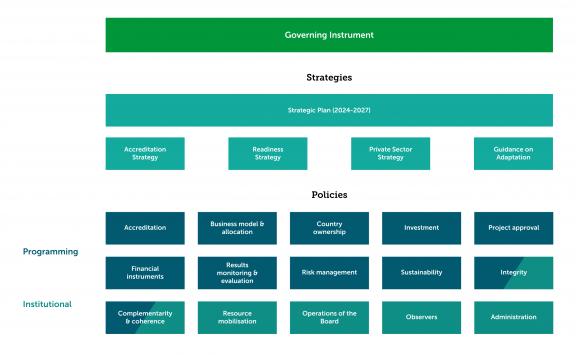Policies & strategies
Policies and strategies
As part of its mandate, the GCF Board approves specific operational policies and guidelines, including for programming, project cycle, administration, and financial management. The Board also approves strategies, which guide the overall direction of Fund operations. Together, these strategies and policies establish the framework for implementation of the GCF’s Governing Instrument.
The main GCF policy frameworks, aligned with the Governing Instrument and strategies, are shown in the diagram below.

Governing Instrument
The Governing Instrument for the Green Climate Fund was approved by the Conference of the Parties to the United Nations Framework Convention on Climate Change (UNFCCC) at its seventeenth session on 11 December 2011 in Durban, South Africa.
Strategic plan & other strategies
In advance of the second Replenishment period the Board updated its Strategic Plan for 2024-2027 at B.36, setting out the major programming directions and operational and institutional priorities for GCF-2. GCF’s initial Strategic Plan was adopted in 2016 for the Initial Resource Mobilization period (2015-2019) and was then updated in 2020 for the GCF first replenishment period (2020-2023).
Private sector strategy
The Board adopted at B.32 the Private Sector Strategy, which sets out the four pillars through which the GCF aims to catalyze private climate finance in a country-driven manner to meet developing countries’ needs and the objectives of the Updated Strategic Plan.
Guidance on adaptation
The Board welcomed at B.33 the Guidance on adaptation which speaks to the GCF’s vision, strategic approach, and scope for supporting adaptation programming, and how the GCF aims to deliver this through its range of modalities that support adaptation activities.
Accreditation strategy
The Board adopted at B.34 the Accreditation Strategy, which clarifies the GCF operating model and guides the evolution of the GCF network of AEs in order to deliver on the GCF’s mandate, objectives and programming directions.
Readiness strategy 2024-2027
The Board adopted at B.37 the Readiness Strategy 2024-2027, which presents the revised strategy for the Readiness Programme that continues to serve as a critical instrument in fulfilling the GCF’s strategic vision and ambition.
Policies
GCF policy frameworks generally include a mix of top-level policies adopted by the Board to govern a specific subject matter, the related Board decisions which adopt the policies and may contain additional policy provisions, and other policy instruments (such as standards or guidelines) which further elaborate how policies should be operationalized.
Clicking on the boxes will take you to the policies in each framework. Alternately, you can search across the entire suite of policies through the search function below.
Search policies & strategies
| Title | Theme | Date |
|---|---|---|
|
Initial no-objection procedure Adopted by decision B.08/10 (b). Establishes the national no-objection procedure to be conducted in the context of the consideration of Funding Proposals. |
Country ownership | 17 Oct 2014 |
|
Initial logic model for REDD+ results based payments Adopted by decision B.08/08 (a) annex X. This document illustrates the initial logic model for REDD+ results-based payments. This logic model presents results specific to REDD+ RBPs at the levels of programme outputs and activities and shows how they relate to the existing paradigm shift objective, impacts (Fund level), and Programme outcomes that are defined in the Fund’s mitigation logic model. |
17 Oct 2014 | |
|
Policies for contribution to the Green Climate Fund for the Initial Resource Mobilization Adopted by decision B.08/13; applicable to IRM. Defines the resource mobilization approach for the initial resource replenishment including sources of funds, types of contributions, financial terms and conditions, commitment authority, and risk mitigation measures. |
Resource mobilisation | 17 Oct 2014 |
|
Guidelines for the operationalization of the fit-for-purpose accreditation approach Adopted by decision B.08/02. Sets out how the Fund's fiduciary standards and ESS will be assessed through a fit-for-purpose accreditation process. |
Accreditation | 17 Oct 2014 |
|
Initial general guidelines for country programmes Adopted by decision B.08/11. Sets out initial general guidelines for country programmes. |
Country ownership | 17 Oct 2014 |
|
Mitigation and adaptation performance measurement frameworks Adopted by decision B.08/07; applicable to all projects up to B.31. Sets out the performance measurement framework to measure the results of the Fund and to serve as the basis for results-based payments. |
Results, monitoring & evaluation | 17 Oct 2014 |
|
Performance measurement framework for REDD+ results based payments Adopted by decision B.08/08 (a). Specifies indicators, reporting responsibilities and frequencies applicable to projects/programmes funded under the REDD-plus results-based payments pilot. |
Results, monitoring & evaluation | 17 Oct 2014 |
|
Initial best-practice options for country coordination and multi-stakeholder engagement Adopted by decision B.08/10 (d). Sets out best practice options for country coordination and multi-stakeholder engagement. |
Country ownership | 17 Oct 2014 |
|
Initial best-practice guidelines for the selection and establishment of national designated authorities and focal points Adopted by decision B.08/10 (c). Sets out best practice guidelines for the establishment of NDAs/focal points. |
Country ownership | 17 Oct 2014 |
|
Administrative guidelines on human resources This document captures the policy as adopted by the Board in decision B.08/17, paragraph (a), and subsequently amended by decisions B.34/20, B.34/21, and B.37/08. The policy was sent to the Board for consideration at B.08 in document GCF/B.08/26 titled “Administrative Guidelines on Human Resources". |
Administration | 17 Oct 2014 |